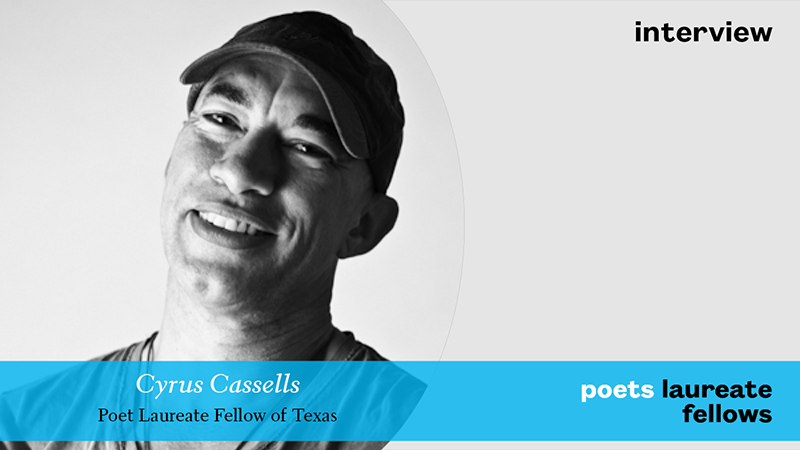
Cyrus Cassells is author of Is There Room for Another Horse on Your Horse Ranch? (Four Way Books, 2024), which was a finalist for the National Poetry Series. In 2022, Cassells was named an Academy of American Poets Laureate Fellow. In honor of Juneteenth, Cassells will hold a poetry contest for students in grades six through twelve across the state that encourages them to explore what makes the day significant. Final judges will be Texas poets Wendy Barker, Jennifer Chang, Amanda Johnston, and Roger Reeves, as well as Texas historian Martha Hartzog. The contest will end with a public reading and ceremony at the Neill-Cochran House Museum in Austin, which has fostered several African American events and cultural exhibitions and features the city of Austin's only intact slave cabin.
Poets.org: What do you hope for the future of poetry in Texas, and what support do you hope future poets laureate there have?
Cyrus Cassells: Houston and San Antonio are now the fourth and seventh largest American cities, so there’s a sense of national (and even international) heft and burgeoning diversity in the state that is reflected in the work and aspirations of Texas poets. Regrettably, when I became the 2021–22 poet laureate, I and the other laureates in various fields received no funding or ceremony, so Texas has far to go in terms of championing the poet laureate’s role in promoting community and culture—unlike Kansas, where Governor Laura Kelly recently said supporting poetry, and all the arts,“is an integral part of our economic development strategy.”
Poets.org: How has being a poet laureate changed your relationship to your own writing?
CC: It’s an incredible honor, but I haven’t noticed any salient changes in my attitude toward myself or my vocation.
Poets.org: How can a poet, or poetry, bring a community together?
CC: On 9/11, one of my closest friends, who was in New York City that day, called and declared, “only a poet can do justice to what happened here today.” In the midst of trouble, chaos, or outright catastrophe, memorable poetry ushers in purpose and clarity, helping a community make sense of life’s challenges and tragedies.
Poets.org: What part of your project are you most excited about?
CC: I’m most excited about the award ceremony at the Neill-Cochran House Museum in Austin, which houses the only intact slave quarters in the city. Besides the exhilaration of hearing the young poets read their winning work, time spent in this dynamic museum enhances their familiarity and grasp of significant Texas history.
Poets.org: What obstacles, if any, did you experience when starting your project?
CC: So far, I’ve been blessed with unfailing enthusiasm for this youth-engaged project to celebrate the new Juneteenth federal holiday.
Poets.org: How can poetry inspire and empower youth when learning about Juneteenth and celebrating it?
CC: One key goal of the project is to expand young Texans’ grasp of why Juneteenth is now a new national holiday. Reading and writing poetry enhances empathy and provides them with emotional and spiritual access to living history.
Poets.org: Is there a poem on Poets.org that inspires you and your work in Texas? How so?
CC: A poem on the site that inspires me in my project is Martín Espada’s “The Republic of Poetry,” the title poem of his eighth volume, a finalist for the 2007 Pulitzer Prize. Espada, a Puerto Rican American activist poet who won the National Book Award last year for Floaters, is one the country’s most eloquent and moving writers. In this poem, there’s so much joy in how Espada depicts a culture, in this case Chile (or a world even), that celebrates poetry and sees it as praiseworthy and essential as bread.
